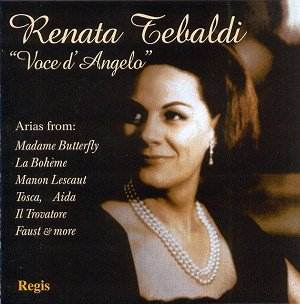Renata Tebaldi's later stereo recordings are usually
preferred over her earlier mono ones. However on this disc we have a
selection from some of Tebaldi's major roles recorded when the singer
was still in her twenties.
Tebaldi's later recording of 'La Bohème' has
sometimes been criticised because her temperament colours her Mimi,
causing the retiring seamstress to sound remarkably imperious. But,
this later recording has also found its way onto the library shelves,
in preference to the famous Beecham/de los Angeles version. These extracts
from 'La Bohème' are taken from Tebaldi's earlier recording,
which itself is still pretty desirable. Rarely can Mimi have been so
beautifully sung. These extracts are a joy for their sheer sound. Just
listen to the exquisite pianissimo high note at the beginning of the
first extract. Tebaldi's 'Mimi' sounds creditably youthful, but still
very, very self possessed. Where she falls down is in the rather generalised
characterisation. What I miss is a relish for the detail of the text;
strange from a native Italian speaker. And the performances lack a certain
vividness. It is here that the spectre of Callas starts to loom. She
is seldom far away when considering Tebaldi's career. Callas's virtues
provide a neat complement to Tebaldi's, so in an ideal world one would
want to have both. Mimi was never in Callas's stage repertoire (she
learned it especially for the La Scala recording), but when listening
to Tebaldi here one cannot but help thinking about the vividness and
verbal felicities that Callas would bring to a role. A recital record
like this, though, is the ideal place to appreciate Tebaldi's art. With
no worries about drama unfolding, you can sit back and appreciate her
considerable qualities.
This is a well filled CD, and the editors have obviously
been concerned to select just the right excerpts from the complete operas.
In these 'La Bohème' excerpts one is brought up short as the
excerpt stops just as the drama continues. The most frustrating instance
is final excerpt from 'La Bohème' which stops as soon as Mimi
expires rather than continuing to the end of the scene, which can only
be described as crass. The tracks are also perilously close together,
with little space to breath. This does, however, mean that we have nearly
74 well filled minutes.
Her "Manon Lescaut" excerpt also gives us a rather
self-possessed Manon, but 'Vissi d'arte' from 'Tosca' is surprisingly
un-diva like. Hearing this made me want to hear the rest of Tebaldi's
Tosca. Her Butterfly hardly sounds 16 but then again who does. From
the first moments of her off-stage entry one cannot help but be seduced
by the beautifully shaped singing. Anyone who thinks of Tebaldi as a
rather undramatic singer should listen to the Andrea Chenier excerpt.
'La Mamma morta' is one of the two live items on this disc and it shows
Tebaldi at her best - a shapely musical line allied to a feel for drama
that is sometimes lacking in the other excerpts. The live recording
comes with some drop in the general quality of the recording, but this
is not appreciable and is more than made up for by the quality of the
performances.
Marguerite in 'Faust' was not a role that I associated
with Tebaldi. But here it is, in Italian, evidently part of her regular
repertoire. She makes a charming Marguerite, even if she does not quite
dazzle in the coloratura passages in the Jewel Song and I did find it
rather on the slow side. Rather interestingly, the booklet mentions
Tebaldi's other excursions from Italian opera. Evidently she sang Wagner's
Eva, Elsa and Elisabeth (all sung in Italian) as well as Mozart's Countess
and Donna Elvira. It would certainly be fascinating to hear extracts
from these performances.
The Verdi extracts are back onto familiar territory.
Her Aida is nearly ideal - only a slight hardening of the top marring
the delivery. The same applies to 'Tacea la notte placida' from "Il
Trovatore". These two extracts from Verdi's operas left me longing for
more. I would quite happily have reversed the balance of the items on
the disc, reducing the number of Puccini items and expanding the Verdi.
The final item is another live one, of the 'Libera
me' from the Requiem. This suffers badly in terms of the recessed sound
of the chorus and the choral singing leaves something to be desired.
But Tebaldi's contribution is spine-tingling, showing what a fine artist
she was when caught live.
This is a fine introduction to Tebaldi's art. Real
newcomers might prefer one of the compilations of her stereo recordings.
However the present recordings are particularly interesting as they
date from before her vocal problems in the 1960s. But for those who
already have the stereo recordings and those people interested in the
young Tebaldi, this disc is highly recommendable.
Robert Hugill

